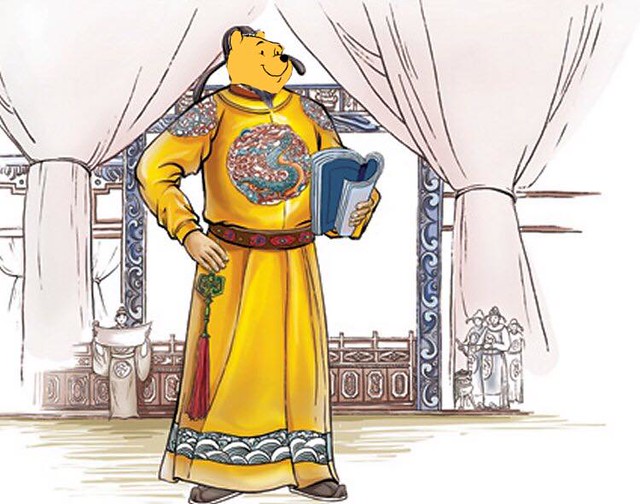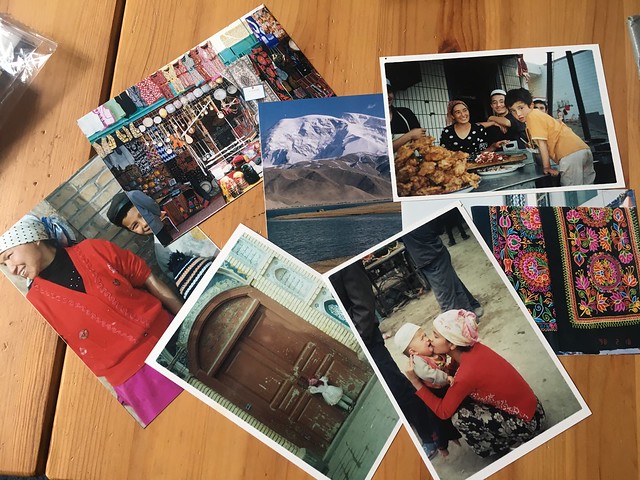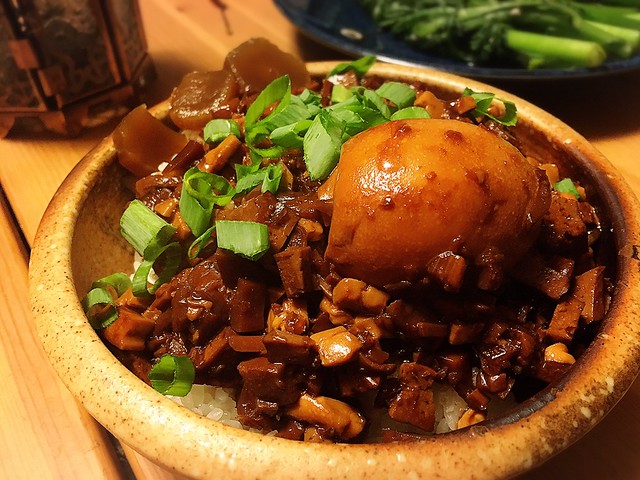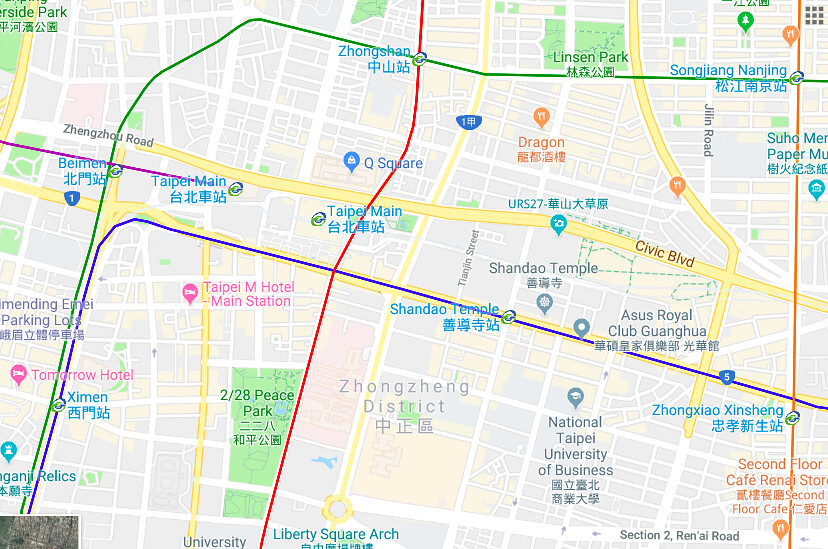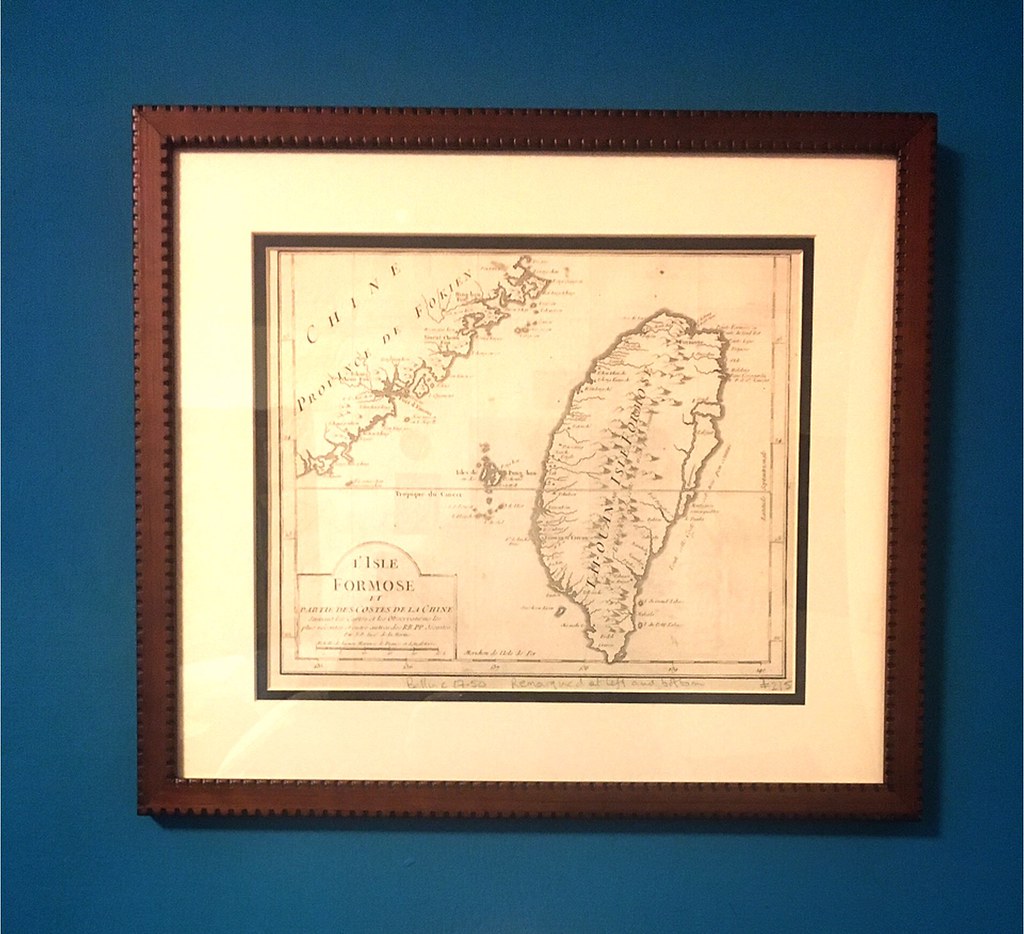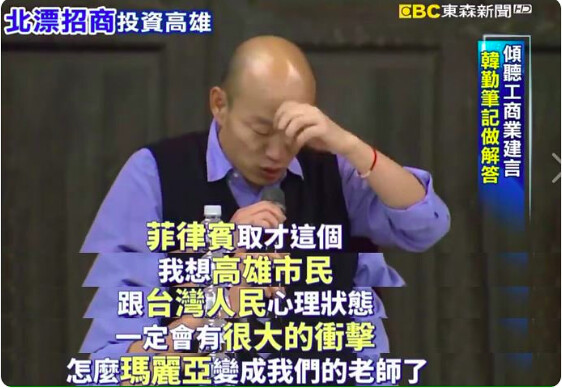 |
| This meme - not established Taiwanese media - is the most accurate translation of Han's actual remarks that I've found. |
So, I'm sure you've all heard by now that Kaohsiung mayor Han Kuo-yu is a racist crapsack, but you might not be entirely clear on exactly how much of a racist crapsack he actually is, because it's impossible to figure out what his exact words were from print media.
In looking for Han's direct quote, I found three different versions in United Daily News, Liberty Times and Storm Media, and decided none of them could be fully trusted. So, I found a video. Here's exactly what he said, with video evidence:
我想高雄市民跟台灣人民的心理狀態一定很大衝擊,怎麼瑪麗亞一下變成我們老師了?
My translation:
I think the hearts of Kaohsiung residents and Taiwanese would be greatly shocked, how can a Maria become our teacher?
'Maria' is a pejorative for a Filipina woman, connoting a woman of humble means who performs domestic labor. It's equivalent to calling them maids - referring to every woman in the Philippines as 'the help'. This particular insult is well-known in Taiwan, where many workers from the Philippines perform blue-collar labor in Taiwan. It's not just a racist word, it's a sexist one too as it specifically denigrates the domestic labor done by foreign women.
That word, "shock" (衝擊) can also mean an assault or lashing - it could just as easily be translated as "would assault the hearts of Kaohsiungers and Taiwanese".
The "...because how can a 'Maria' become our English teacher" is also important to understanding Han's meaning, it implies unlikeliness, impossibility, or mockery. How could The Help possibly teach us?
This is what he means and an accurate translation of his remark makes that clear.
Han goes on to say (from the video linked above, translation mine):
往菲律賓取才我覺得這個在一個克服的過程。... 如果我們從菲律賓引進教英文的師資,高雄的家長能不能接受? 所以我才會用瑪麗亞三個字,來做一個表述,所以我用瑪麗亞三個字不是有其他的意思在。...你為什麼不找美國,澳大利亞,英國的,你為什麼找隔壁菲律賓的?我的意思是說,家長心裡會有一個障礙。可是呢?菲律賓外語人才的輸出,已經很成熟,這個兩個這間,怎麼樣說服高雄的家長?
Filipino talent, I think this is a process of overcoming....if we introduce qualified English teachers from the Philippines, would Kaohsiung patriarchs/heads of household/old-timers be able to accept it [with the implication that they would not]. So, I can only say 'Maria' it's just an expression, so when I say 'Maria', there's no other meaning....Why don't you find American, Australian, English ones, why do you find people from the nearby Philippines? My meaning is, that's a mental obstacle for these 'patriarchs'/old timers. But? The Philippines sending out foreign language speakers is already very common. Between these two [extremes], how can we convince those old-timers?
This sounds like a reasonable position to take, because it's surely true that there are many racist people in Kaohsiung and Taiwan who would be bothered by or opposed to having teachers from the Philippines in positions of authority and respect in Taiwan, because to them, they are just "Marias".
That doesn't absolve Han of his initial comments, though. First, to say "I didn't mean anything other than that by the word 'Maria'" is about as tired an excuse as "I only used the N-word because I heard it in a rap song, not because I meant something racist."
And it doesn't hold up to even the barest scrutiny as an explanation: he's not quoting anyone in particular when he calls Filipinas 'Marias'. The word came out of his own mouth. He used it offhandedly, like a normal word anyone would use. He didn't adequately signpost his remarks as a quote or description of an attitude, because that's not actually what they were despite his "clarifications" later.
If Han had really meant to describe what Taiwanese think, and make it clear that he disagrees, he wouldn't have said 'Maria' so casually in the first place. This marks him not as an ally, but a concern troll: defending his words as describing what the other side thinks, but showing through his unconsidered language choices that, on some level, he is a part of that 'other side'. Someone who truly wants to change racism against Southeast Asians in Taiwanese society would simply not say "...how can a Maria become our teacher?"
It boils down to his meaning being, "I don't hate Marias, I'm just worried about racism in Taiwan, what with everyone used to them being so poor and being maids and all, it's sad to me that nobody wants those Marias to be their English teachers. I'm just concerned!"
He didn't say "many Taiwanese unfortunately have an obstacle in their thinking to accepting the idea that teachers from the Philippines could teach them, and that is wrong. We need to persuade them and overcome this obstacle, because there are many qualified professionals, including teachers, from the Philippines." He didn't even say "many Taiwanese think of workers from the Philippines as 'Marias' and that is a problem", which, while a bit gasp-worthy, is at least kind of an accurate description of what some Taiwanese people think.
He said, and I repeat, "how can a Maria become an English teacher?" as casually as an American racist might say "How'd a ________ like her get a nice car like that?"
(And see how I made it quite clear that such horrid language describes views that exist in the world, but does not reflect my own views? It's not hard.)
At the very least it didn't occur to him that unthinkingly tossing off the 'Maria' epithet might be a problem. That only happens when someone already thinks of a group of people that way, not when they are signaling disagreement or condemnation of an opinion others hold.
And if a leader is caught in such a gaffe and tries to insist that they don't personally feel that way about a particular group, but they're just worried that everyone else does, that's simply unacceptable. Leaders should not inflame societal prejudices, even if they are common; they should be examples of a higher, more forward-thinking standard.
Let's keep in mind as well that he tows the same 'concern troll' line with marriage equality, saying his real concern is "the next generation" (won't someone think of the children?), not that he is anti-gay, while fraternizing with anti-gay groups.
And he didn't even bother to defend his remark until later in the meeting when directly asked about it, or show awareness that 'Maria' is more than 'just an expression'.
If you look at reporting of Han's comments, you get distortions of what he said all over the place (all translations are mine). Some make his wording look a lot worse - from UDN:
引進菲律賓人才,這恐怕對高雄人、台灣人心理衝擊大,因為瑪麗亞怎麼變老師了?
Introducing Filipino talent, I'm afraid (as in, scared - not regretful) that this will be a shock to Taiwanese and Kaohsiung residents, because how can a Maria become a teacher?
From Liberty Times:
這恐怕對台灣人心理衝擊大,因為瑪麗亞怎麼變老師了?
I'm afraid that this would be a shock to the Taiwanese, because how can a Maria become a teacher?
And from Storm Media, inexplicably making him look better:
韓國瑜認為,確實能夠借重,但必須先克服市民及台灣人民的心理障礙,讓「瑪莉亞變老師」,很多人內心會有衝擊。
...「我覺得我想高雄市民跟台灣人民,心理一定有很大衝擊,瑪莉亞變成我們老師了,這要克服的過程,這可能心理衝擊很大。」
Han Kuo-yu believes it is indeed possible to take advantage of /get benefits from [talent from the Philippines], but the psychological barriers of the people of Taiwan must first be overcome - to let "'Marias' become teachers", a lot of people will be shocked.
"I think / I think that Kaohsiung residents and Taiwanese will be very shocked, Marias become our English teachers, we need to overcome this, this can be a huge shock."
Storm tried to soften the impact of his words by mashing two quotes together - "Marias become our English teachers" and "we need to overcome this", making it seem as though he said these two things at the same time, when he didn't (which the video makes clear by his different positioning). It also erases the "because how can a Maria become our teacher?" by selectively cutting his quote and replacing "because how can..." (怎麼) with "let" (讓) outside the quote marks.
In English the reporting isn't much higher quality.
From Focus Taiwan, which offers the most accurate translation:
Responding to a proposal that Taiwan could hire bilingual Filipino white-collar workers at a conference on Wednesday, the mayor said employing "Marias" as teachers would be a psychological shock for Taiwanese.
There's also this from Taiwan News, which is far worse but just translates the garbage from Storm Media above but does so in a way that make Han's comments sound erudite in English, when they weren't particularly eloquent in Mandarin:
In response to this, the Kaohsiung Mayor admitted the Philippines’ abundance of skilled labor could benefit the city, but said its residents would first need to overcome some “internal conflicts.”
“I believe witnessing ‘Marias’ become teachers would cause a clash in the hearts of the people of Kaohsiung, and Taiwan’s population at large. This is something that needs to be overcome; likely a huge internal conflict,” Storm quotes Han.
And the Taipei Times, with what I think is the most inaccurate translation:
Han on Wednesday told a meeting of the Chinese National Association of Industry and Commerce in Taipei that he feared that hiring educated employees from the Philippines as English teachers “would cause a psychological shock for Taiwanese, as people might wonder: How has our Maria become a teacher?”
Focus Taiwan accurately placed the 'Maria' comment within the attitude of Han, which is the context in which he made it, and not as a description of what he thinks other Taiwanese think. The other two make him sound much better than he actually did, and situate the 'Maria' quip not as Han's own word (which it is) but as a description of something he disagrees with (which is not what he said until pushed - which outs him as a concern troll.) Some translations (like Taipei Times' work) add connotations to the translation - e.g. "wondering" - that are simply not there in his actual words.
All of these seem so odd to me, because the video of his remarks is publicly available. I'm not even a native Mandarin speaker or a perfectly fluent one, and yet I found and translated it with little problem.
So why do some quotes - like Liberty Times and UDN - make Han's remark seem more shocking than it was (and to be clear, it was quite shocking on its own and did not need to be sexed up)? And why do others - like Storm Media - make it sound like not much at all? How is this unclear and inaccurate media reporting of Han's remarks affecting how Taiwanese think about the incident, and is it distorting public discourse?
In English at least, it is having a distorting effect. Several posts on social media have pointed out that Han's remarks should not be considered offensive, because that's what some Taiwanese really think, based on the Taipei Times and Taiwan News translations.
This makes me wonder how can we even have a real conversation about Han's remarks and racism in Taiwanese society if what we read isn't quoting him correctly.
I'm not sure why Storm Media - which I've found to be typically more reliable - made Han look better than he deserved, and why a pan-green and pan-blue rag each made him look worse. But because the inaccuracies are present across the entire media-political spectrum, it doesn't point to an attempt to polarize the Taiwanese political cleavage.
Rather, I think it's just plain old bad reporting.
I'll finish off with something bad, then something good.
Something bad:
Kaohsiung Mayor Han Kuo-yu (韓國瑜) on Saturday apologized for a recent remark in which he referred to Filipinos as "Marias," saying the term, considered by many to be a racial slur, was a slip of the tongue.
Han was sorry for the misunderstanding caused by his misuse of the term and said he looks forward to future cooperation with the Philippines, it added.
"Maria" is not "considered by many" to be a racial slur. Jesus F. Christ. It is a racial slur. Period. Han Kuo-yu said it, and only tried to insist it was a description of what other people think after he was called to task for it, without ever explaining why he'd throw it out so casually (because there is no explanation that absolves him).
It was not a "misunderstanding". We all understood him perfectly. People in the Philippines understood him quite accurately. And he didn't misuse the term - he used it exactly as it's meant to be used in racist speech.
Just as when my (dearly departed) grandpa referred to "those people" and then insisted, when I pressed him, that he hadn't meant it as an insult but "they're just a different community", I knew perfectly well that that's not what he'd meant.
But then there's the good thing: when I moved to Taiwan 12 years ago, I don't know that a comment like this would have caused this kind of uproar in Taiwan. I passed more than one "Foreign Labor Go Home" protest, with old men carrying signs. I don't even know if such language was common then, because my Mandarin was crap, and I never heard of anyone raising a fuss about it.
But in 2019, despite some attempts to justify Han's language, the overwhelming response of Taiwanese public discourse is that it is not acceptable to talk this way, and racist speech and actions should not be tolerated.
If Han is correct about how many Taiwanese might think of English teachers from the Philippines - and he is, for some people - the fact that the backlash has been so swift and damning proves that not all Taiwanese think this way.
That said, it doesn't seem to be hurting his approval ratings, although I have long suspected something is really weird about whatever force underlies those ratings which is propping up Han.
Taiwan has a long way to go - we need to treat immigrants from Southeast Asia better, end discrimination and give them the same opportunities for permanent residency and citizenship that white collar workers (who are largely Western) have - but this is real progress.

